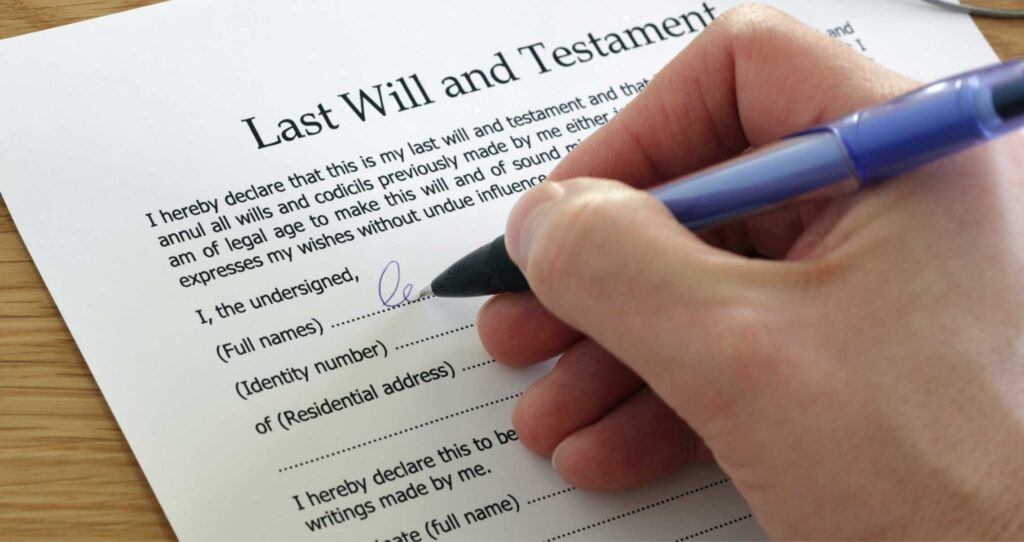
Table of Contents
Decoding the Basics: What Are Wills and Trusts?
The Anatomy of a Will: Essential Components and Functions
A will, fundamentally, is a legal document that delineates how an individual’s assets and responsibilities will be handled after their demise. It serves as a directive to a probate court regarding the distribution of property, management of debts, and care of any minor children.
The essential components of a will include the testator’s identification, clear statements in relation to the appointment of guardians for minors, and the designation of an executor who is responsible for executing the provisions in the will.
Notably, the will must be signed and dated, usually in the presence of at least two witnesses, ensuring its legitimacy. This document becomes effective only upon the death of the testator, whereby the probate process begins a legal process that validates the will and oversees the distribution of assets according to the stipulations outlined therein.
The functionalities of a will extend beyond mere asset distribution; a will can help mitigate disputes between heirs by clarifying the testator’s intentions. Additionally, it allows for specifying particular bequests, where a testator can leave specific possessions to chosen individuals, thereby making their wishes explicitly clear.
Moreover, many people overlook the utility of a will in providing instructions on funeral arrangements, which can alleviate the burden on grieving loved ones. Nonetheless, it is essential to acknowledge that while wills serve as a foundational aspect of estate planning, they lack the advantages of trust mechanisms, particularly in terms of privacy and adaptability.
Trusts Unveiled: Types and Their Unique Advantages

Source: firstcitizens.com
Trusts, unlike wills, are versatile estate planning instruments that often provide advantages far beyond what a will can offer. At their core, a trust is a legal arrangement in which a grantor transfers assets into a trust for the benefit of designated beneficiaries. The assets are then managed by a trustee according to the terms set out in the trust.
There are several types of trusts, each designed for specific objectives:
- Revocable living trusts – allow the grantor to retain control of assets during their lifetime, with the option to modify or revoke the trust.
- Irrevocable trusts – transfer control permanently, often used for tax benefits or stronger asset protection.
- Special needs trusts – provide financial support for individuals with disabilities without affecting eligibility for government assistance.
- Charitable trusts – direct assets toward philanthropic causes while offering tax advantages.
One of the biggest advantages of trusts is their ability to bypass the probate process, ensuring faster and smoother distribution of assets. This can make a significant difference for families already coping with emotional and financial strain.
Another benefit is privacy. Unlike wills, which become public records once probated, trusts remain confidential. This helps protect both beneficiaries’ identities and the details of their inheritance. Finally, trusts offer flexibility in asset management, making it possible to tailor solutions to different family dynamics, long-term financial goals, or complex estates.
Understanding the types of trusts is only the first step. The more decisive action is learning how to actually set one up in a way that aligns with personal goals. Depending on the jurisdiction, the process can be straightforward or highly specialized.
Some people choose to open a trust in international financial centers such as the British Virgin Islands, which are known for strong legal frameworks and privacy protections. Exploring such options ensures that the structure you establish is both legally sound and tailored to your family’s future needs.
Legal Jargon Demystified: Key Terminology You Need to Know

Source: sci.co.bw
Understanding wills and trusts requires navigating a maze of legal terminology which can often be confusing. Key terms worth being familiar with include “testator,” referring to the individual creating a will, and “executor,” the person tasked with ensuring that the will’s provisions are honored and executed.
Similarly, in trust documentation, “grantor” refers to the person establishing the trust, while the “trustee” is the individual or entity entrusted with the management of the assets within the trust. The “beneficiary” represents the recipient of the trust’s benefits, whether that be income, assets, or other advantages derived from the trust.
Additionally, the “probate” refers to the legal process through which a will is validated and executed, often involving court proceedings. Understanding these terms contributes significantly to demystifying the estate planning process, enabling individuals to make informed decisions regarding their legacies.
Knowledge of legal terms helps frame discussions with professionals, ensuring that beneficiaries and grantors alike can seek clarity on their roles and responsibilities efficiently. A well-informed individual is always more adept at navigating the complexity of estate planning with confidence.
The Battle of Legacy: Why Choose a Trust Over a Will?
Control and Flexibility: How Trusts Stand Out
The landscape of estate planning is often fraught with complexity and competing family dynamics. One of the standout features of trusts is the level of control and flexibility they afford grantors. Unlike wills, which dictate the distribution of assets upon death, trusts allow for more strategic planning and management during a person’s lifetime as well as posthumously.
For example, a trust can be structured to provide for a beneficiary only at certain milestones, such as reaching a particular age or achieving specific educational goals. This aspect not only helps to motivate beneficiaries but also protects them from potential financial missteps.
Additionally, in the event of incapacitation, a trust ensures that the appointed trustee can seamlessly manage the trust’s assets without the necessity of court intervention, as would be the case with guardianship proceedings for someone with only a will.
This streamlining of the management process reflects a profound respect for the individual’s wishes and can prevent familial disputes by designating clear roles and guidelines prior to any potential incapacity. This proactive approach to decision-making stands as a stark contrast to the one-size-fits-all approach taken by wills in many cases.
Privacy Matters: The Confidentiality of Trusts Explained

Source: smartasset.com
Privacy is an invaluable commodity in estate planning, and trust offers this essential benefit without hesitation. When a will is probated, it becomes a matter of public record. Anyone can access details regarding the deceased’s assets, debts, and beneficiaries, which often leads to unwarranted intrusions and can incite familial disputes.
Trusts, conversely, can remain entirely confidential. This confidentiality not only safeguards the privacy of the deceased but also protects the beneficiaries from unwanted scrutiny and potential strains on family relationships.
The layer of confidentiality offered by trusts can particularly appeal to individuals with significant or complicated asset portfolios, as they may not want the details of their estate disclosed publicly. Furthermore, using trusts can mitigate potential disputes and challenges to the estate, as the mechanisms in place often lead to clarity and a streamlined process that allows beneficiaries to access resources they are entitled to without the additional hurdles associated with public probate proceedings.
Tax Benefits and Asset Protection: The Financial Advantages of Trusts
The financial intricacies linked to trusts provide an attractive allure for many prospective grantors. Trusts can serve as powerful tools for effective tax planning and asset protection. Irrevocable trusts, for instance, enable the grantor to remove assets from their taxable estate, potentially lowering estate taxes upon death. This can be particularly beneficial for high-net-worth individuals looking to preserve wealth across generations while minimizing tax liabilities.
Moreover, trusts can offer protection against creditors and lawsuits, especially when structured as irrevocable. By transferring assets into a trust, those assets may no longer be subject to personal debts or creditors’ claims, safeguarding the beneficiaries’ interests.
Additionally, certain types of trusts can help in preserving government benefits for beneficiaries with special needs by not interfering with their eligibility for assistance programs. These financial strategies significantly bolster the argument for establishing a trust over a will, especially for those heavily invested in shielding their legacy against unforeseen circumstances and maximizing the value passed on to future generations.
Combining Forces: When to Use Both a Will and a Trust

Source: jplp.co.zw
A Comprehensive Estate Plan: The Power of Synergy
While trusts offer numerous advantages, wills still play an indispensable role in comprehensive estate planning. A synergistic approach incorporating both trusts and wills will often yield the most effective benefits, enabling individuals to effectively curate their legacy.
For instance, a will can be utilized to address any assets remaining outside of a trust at the time of death, ensuring these assets are disposed of according to the testator’s wishes. Additionally, through a “pour-over” will, unallocated assets can be transferred to the trust, facilitating a smoother distribution process.
This combination effectively ensures that all assets are accounted for, maximizing the use of the trust’s capabilities while harnessing the clear directives of a will. Furthermore, using both enables individuals to provide direction for minor children or dependents through a will, while utilizing a trust for the management of financial affairs, thereby establishing a robust framework to address all facets of one’s estate. Integrating these two powerful instruments ensures that estate plans can adapt to life’s inevitable changes, shifting family dynamics, and evolving financial landscapes.
Navigating Complex Situations: Blending the Best of Both Worlds

Source: elizabethmiddletonsolicitors.co.uk
In certain scenarios, an individual’s unique circumstances may demand a more nuanced approach, combining both wills and trusts to account for family complexities. For instance, families with children from previous marriages may seek a strategy that equitably addresses the inheritance rights of all children while fulfilling specific wishes stipulated by the grantor.
Here, the distinct privacy protections, asset management, and tax strategies offered by trusts can work harmoniously with wills that define custodial decisions for minors, thereby granting peace of mind in making provisions that honor the unique relationships within the family.
Furthermore, in cases involving blended families, the capacity to integrate both a will and a trust provides the flexibility needed to address different beneficiaries and variables that could influence distributions.
Understanding this orchestration allows individuals to gain peace of mind knowing that they are creating a comprehensive plan that accommodates each part of their familial structure. Adaptation remains essential; particularly when navigating varying relationships, thus empowering families to steward their legacies effectively while fostering harmonious relationships among beneficiaries.
Common Misconceptions: Debunking Myths about Wills and Trusts
Despite their significant roles in estate planning, misconceptions abound regarding wills and trusts, potentially leading individuals to make uninformed decisions. One prevalent myth is that trusts are only for the wealthy or those with complicated estates; however, this misunderstanding can limit accessibility to beneficial estate-planning tools for many individuals. In reality, trusts can democratize estate planning, offering flexible solutions that anyone can capitalize on, regardless of their financial standing.
Another misconception is that wills provide adequate protection against probate, while, in fact, they must undergo the process, often resulting in delays and additional expenses. Many people also erroneously believe that simply having a will is sufficient.
However, neglecting to consider trusts can lead to missed opportunities for privacy and asset management. Additionally, some individuals mistakenly think that trusts eliminate the need for a will entirely; this is inaccurate as a will may still be necessary to cover assets not placed in the trust, establishing guardianship, or even resolving minor assets.
By addressing these myths, individuals can cultivate a more profound understanding of the significance of estate planning tools and strategies, ensuring they maximize benefits while adhering to their wishes.
Getting Started: Setting Up Your Will and Trust the Right Way

Source: elderlawyersfl.com
Finding the Right Professional: Lawyers, Notaries, and Online Options
When embarking on the journey of estate planning, finding the right professionals is paramount to effectively establishing both a will and a trust. Engaging with estate planning attorneys is typically recommended, as they possess specialized knowledge and expertise, navigating through local laws and regulations that can vary significantly across jurisdictions.
Legal professionals can offer tailored guidance, ensuring all documents reflect the individual’s intentions accurately, executed legally to prevent future disputes.
However, not everyone may require the extensive services of an attorney. In some cases, individuals with simpler estates may explore online platforms that provide templates and document creation services for wills and trusts.
While these resources can offer convenience and cost savings, users should approach them cautiously, ensuring that they adequately understand their particular legal landscape and pitfall. Whichever route is taken, conducting thorough research, reading reviews, and verifying credentials is essential to ensuring the professional involved shares a commitment to safeguarding individual legacies.
Essential Questions to Ask During Your Consultation

Source: balelaw.com
During consultations with estate planning professionals, it is wise to prepare questions that will reveal their approach and philosophies towards estate planning. Key questions may include inquiries about their approach to customized estate plans, experience with specific circumstances similar to yours, and their fees.
Understanding whether a flat fee or hourly rate is employed can impact your planning budget significantly. Asking about the professional’s continued involvement and support post-document creation is essential, as changes to your life circumstances will likely necessitate updates to your estate plan.
Additionally, inquiring about their views on blending wills and trusts will clarify their grasp of comprehensive estate planning. This dialogue can help gauge the professional’s readiness to build a collaborative relationship aimed at ensuring your estate planning aligns with your family’s unique dynamics and financial goals. An estate planning professional should not only provide templates but should also guide and educate you throughout the intricacies of the processes involved.
Common Pitfalls to Avoid in Estate Planning
When crafting a will and trust, certain pitfalls can derail effective estate planning and lead to complications in the future. A common mistake includes failing to update documents post-major life events such as marriages, divorces, births, and deaths. These changes can significantly affect beneficiaries and guardianship priorities, and neglecting to adjust your estate plan can lead to unforeseen disputes and intentions going unheeded.
Another frequent misstep involves overlooking important assets or failing to fund a trust, leaving certain properties out of the intended distribution loop. Ensuring that assets are titled correctly and belong to the trust can prevent complications down the line.
Additionally, individuals often underestimate the potential costs associated with probate, neglecting to set realistic plans to manage these expenses. Moreover, lack of communication with family members regarding estate plans can cause confusion and conflicts upon death. Therefore, fostering open dialogue about seemingly sensitive matters can ease burdens and foster trust within familial relationships.
Ultimately, understanding the synergies between wills and trusts, alongside navigating the common pitfalls, empowers individuals to create purposeful and nuanced estate plans that stand the test of time, ensuring that their legacies live on as intended. By being well-informed and approaching estate planning with diligence, individuals can confidently conclude their financial affairs and secure the well-being of their loved ones.







